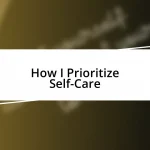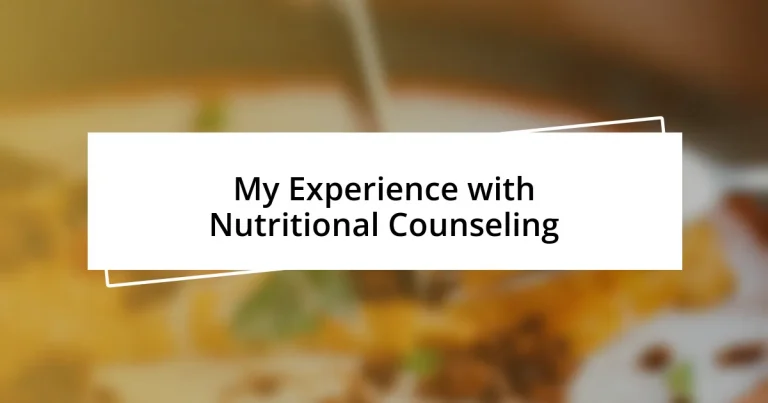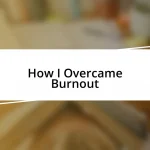Key takeaways:
- Nutritional counseling encompasses emotional and behavioral aspects of eating, encouraging gradual lifestyle changes rather than strict diets.
- Choosing a qualified counselor involves evaluating their credentials, experience, approach, and communication style to ensure a supportive partnership.
- Reflection on goals shifted from short-term weight loss to building sustainable habits and a healthier relationship with food.
- Overcoming challenges, such as emotional eating and social situations, was facilitated through goal reassessment and developing coping strategies with the counselor.
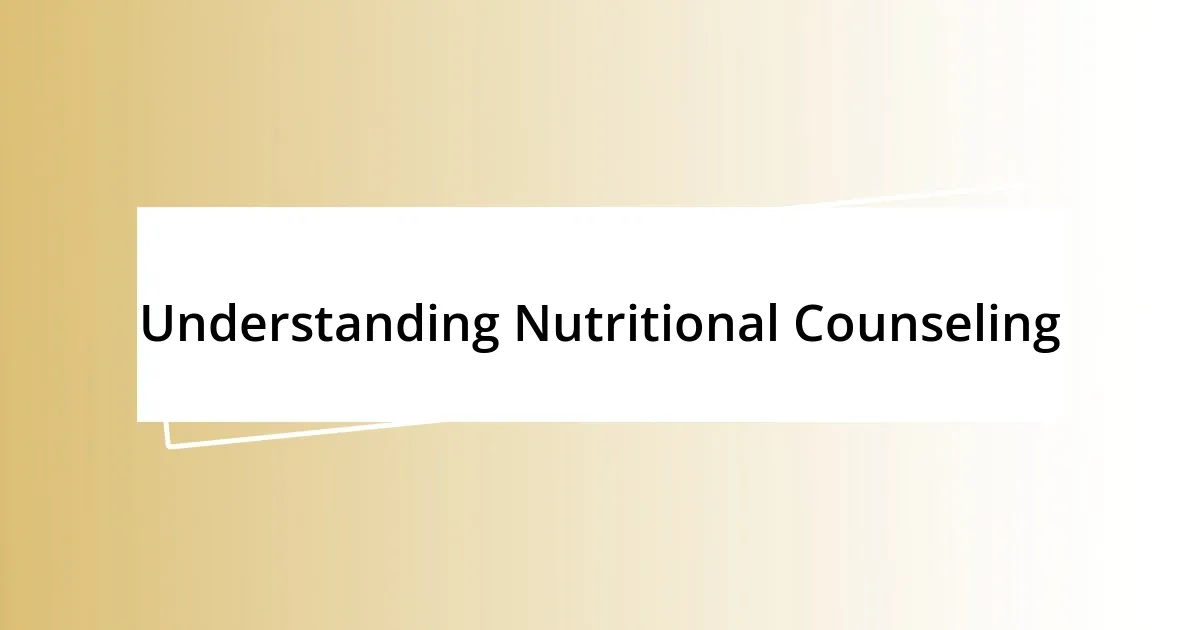
Understanding Nutritional Counseling
Nutritional counseling goes beyond simply telling someone what to eat. It’s about understanding an individual’s unique needs, preferences, and lifestyle while fostering a supportive environment for change. I remember sitting across from my counselor, feeling a mix of hope and skepticism—could I really change my habits?
Through my journey, I realized that nutritional counseling is not just about food; it’s inherently linked to emotions and behaviors surrounding eating. Have you ever noticed how stress or mood can impact what you crave? That was a major revelation for me—it made me look at my eating patterns from a new perspective, focusing not only on what I was consuming but also why I reached for those comfort foods during tough times.
As I worked with my counselor, she encouraged me to set realistic goals and celebrate small victories. This tailored approach made all the difference; instead of overwhelming me with strict diets, we focused on gradual changes that felt achievable. Isn’t it interesting how feeling supported can empower you to make lasting changes? Each step felt less like a burden and more like part of a journey toward a healthier, happier me.
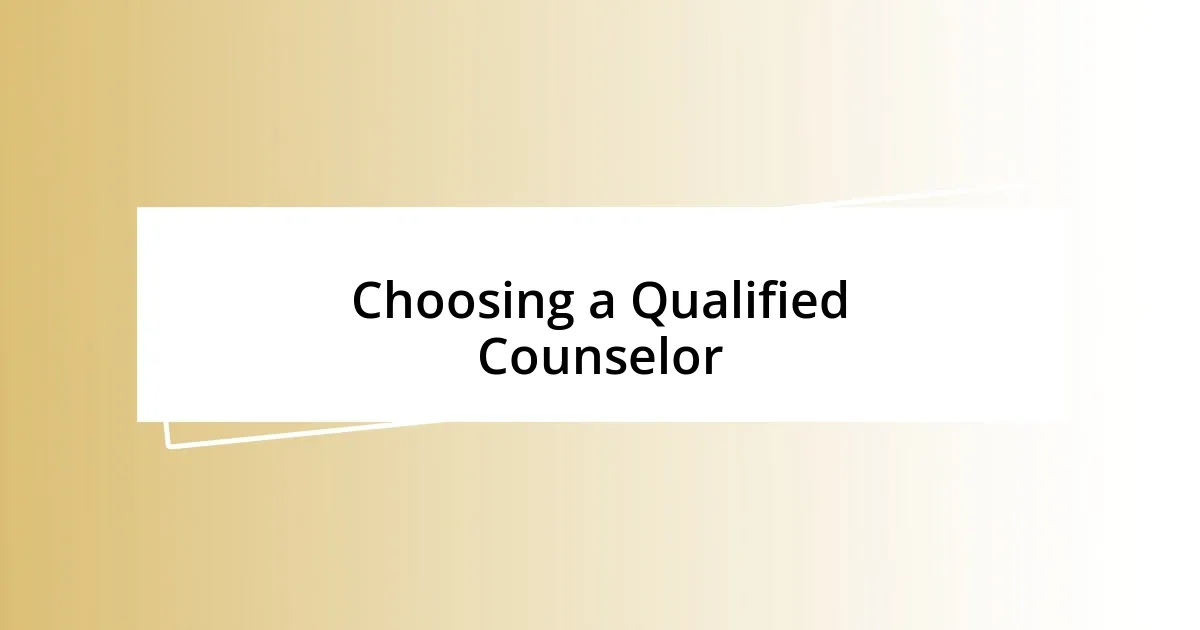
Choosing a Qualified Counselor
When choosing a qualified nutritional counselor, it’s essential to evaluate their credentials and approach. I recall my initial search, feeling somewhat overwhelmed by the options available. It’s imperative to find someone who not only holds relevant qualifications but also resonates with your personal journey. Trust me; the right counselor will help you feel understood and valued, making a world of difference in your progress.
Here are a few key factors to consider when making your choice:
- Credentials: Look for registered dietitians (RDs) or certified nutrition specialists (CNS) who have formal training and expertise.
- Experience: A counselor with specific experience in your areas of concern—such as weight loss, diabetes, or emotional eating—can provide tailored guidance.
- Approach: Ensure their philosophy aligns with your values. I appreciated a holistic approach that considered my lifestyle rather than a one-size-fits-all diet.
- Communication Style: A good counselor should communicate in a way that feels supportive and encouraging, making the counseling experience feel more like a partnership.
- Specialization: Some counselors focus on specific dietary needs, such as plant-based diets or food sensitivities, so consider what matches your requirements.
Finding the right fit may take some time, but it’s worth it for the supportive growth you’ll experience.
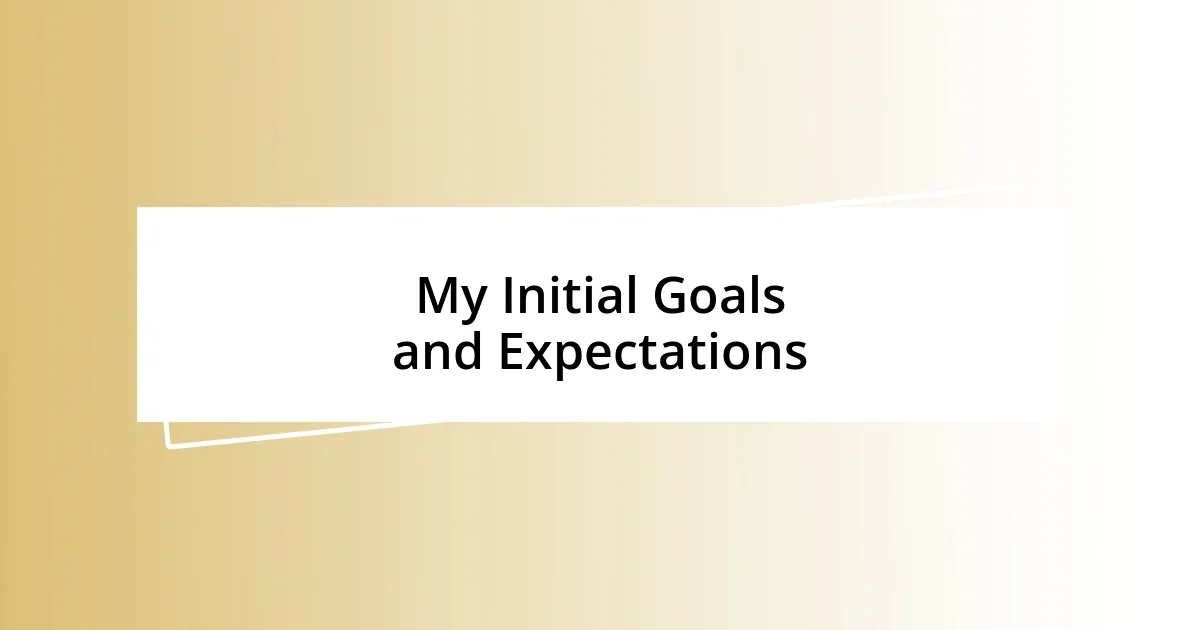
My Initial Goals and Expectations
When I first began my nutritional counseling journey, my initial goals were straightforward: I wanted to lose weight and feel more energized. However, as I sat with my counselor, I quickly realized that these surface objectives were just the tip of the iceberg. I remember writing down my aspirations, and for the first time, I allowed myself to consider my emotional connections to food. This reflection made me aware of how often I turned to snacks for comfort rather than hunger.
As our sessions progressed, I found myself hoping for more than just weight loss; I wanted to cultivate a healthier relationship with food. I still vividly recall a moment when I faced a cupcake at a gathering, feeling torn between indulgence and restraint. My counselor had taught me that balance is key, and I was eager to experiment with moderation rather than deprivation. The excitement of discovering new recipes and learning to enjoy treats in a mindful way felt liberating.
Ultimately, my expectations shifted toward building sustainable habits rather than pursuing quick fixes. This mindset change was a game-changer for me. I started to prioritize not just what I was eating, but also how I was feeling. This holistic view fueled my motivation, and I began to envision myself thriving in a lifestyle I could maintain long-term.
| Initial Goals | Expectations |
|---|---|
| Weight Loss | Long-term Health |
| More Energy | Mindful Eating |
| Better Mood | Emotional Awareness |
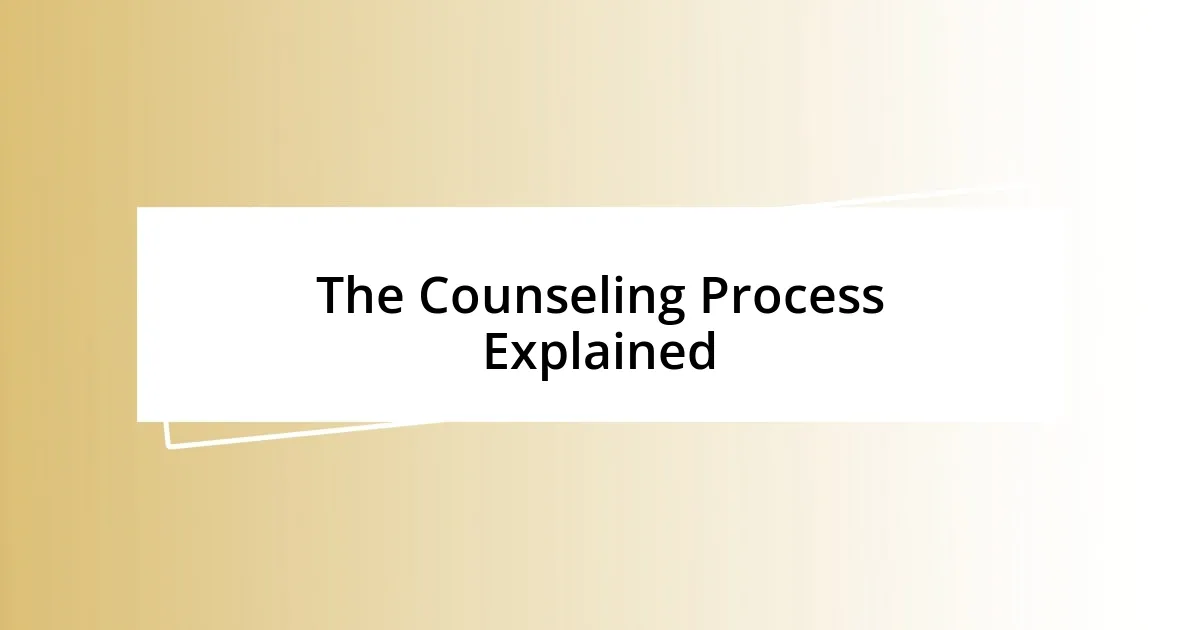
The Counseling Process Explained
The counseling process is a journey, and for me, it started with an in-depth assessment. During my first session, my counselor asked questions that really surprised me. “What does your typical day look like?” she inquired, urging me to analyze not just my food choices but my routines and triggers. This made me truly reflect on patterns I hadn’t noticed before, like how stress was influencing my eating habits.
Next came the goal-setting phase, which I found to be both exciting and a bit daunting. I remember sharing my aspirations, feeling vulnerable as I exposed my desires. The counselor emphasized the importance of SMART goals—Specific, Measurable, Achievable, Relevant, and Time-bound. By framing my objectives this way, I could see a clearer path forward, rather than just a vague wish to “eat healthier.” I found this structure immensely valuable, as it turned my goals from dreams into actionable steps.
As we moved through the sessions, I discovered that accountability was an integral part of the process. Each week, we reviewed my progress, celebrating small victories and discussing setbacks without judgment. I’ll never forget the pride I felt after staying mindful throughout a challenging holiday dinner. It wasn’t just about the food; it was about embracing each moment and applying what I was learning in real-time. That transformative experience kept me motivated and invested in the process.
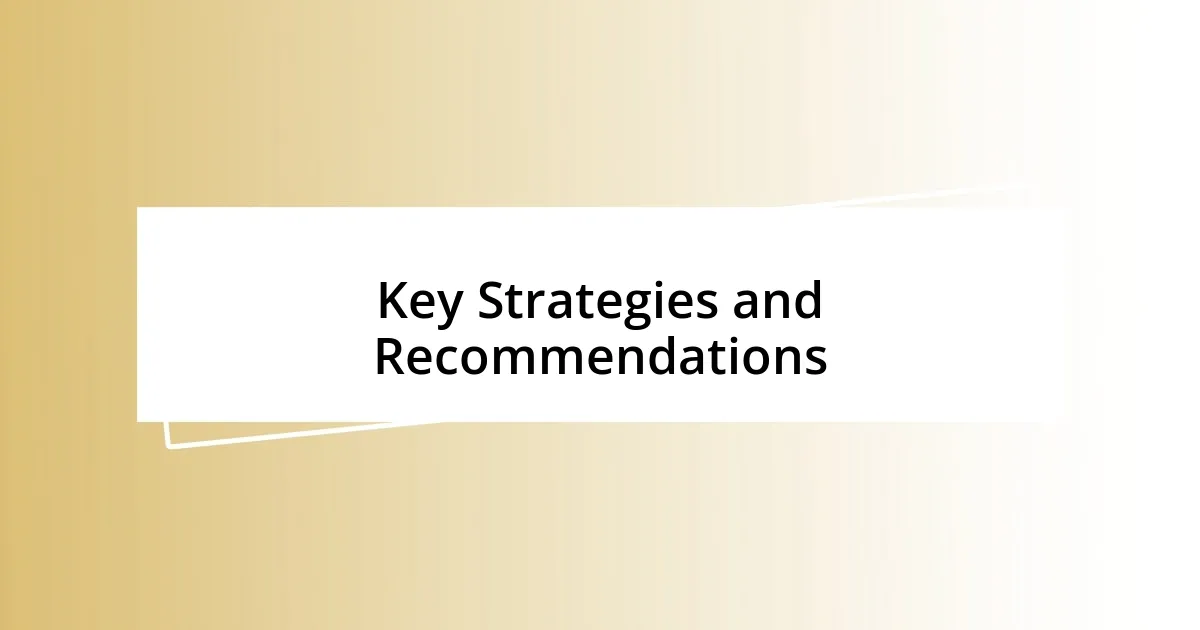
Key Strategies and Recommendations
Embracing meal prep was a game-changer in my counseling journey. I vividly remember the first time I dedicated a Sunday afternoon to cooking. The aroma of roasted vegetables filled my kitchen, and I felt accomplished. Having ready-to-eat meals not only saved time during hectic weekdays but also kept me from resorting to unhealthy snacks. Isn’t it amazing how a little planning can lead to such a big difference in making mindful choices?
Another key strategy was keeping a food journal. At first, I thought it would feel tedious, but it turned out to be enlightening. I began jotting down not just what I ate but also how I felt before and after meals. This reflection helped me recognize patterns—like how my mood influenced my eating habits. Seeing these connections in black and white provided insight I never had before, and it often encouraged me to ask myself, “Am I truly hungry, or is there something else at play?”
Lastly, I found that incorporating regular check-ins with my counselor helped me stay on track and accountable. Throughout my weeks, I’d find myself reflecting on our discussions, and I began to realize the power of sharing my victories and struggles. It became a safe space to vocalize challenges I faced during family gatherings or stressful workdays. Having that ongoing support made me feel empowered, reminding me that this journey is not just about nutrition but about nurturing my overall well-being. How can such a supportive relationship not spill over into every aspect of life?
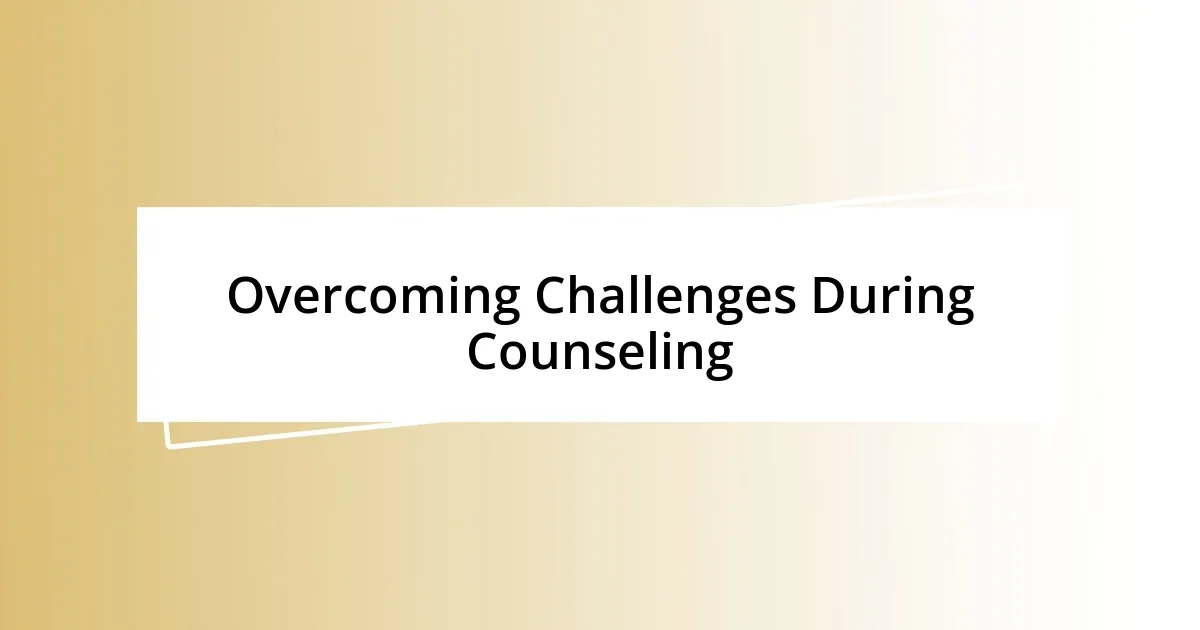
Overcoming Challenges During Counseling
Overcoming challenges in nutritional counseling isn’t always easy, but it often presents opportunities for growth. I vividly recall a point when I hit a plateau in my progress, feeling somewhat disheartened. It was during one session that my counselor encouraged me to view these plateaus not as failures, but as pauses to reassess and realign my goals. That reframing was like a light bulb moment for me, reminding me that setbacks could catalyze new strategies rather than simply marking defeat.
Another hurdle I faced was navigating social situations that often revolved around food, such as birthday parties and weddings. I remember feeling anxious before a friend’s gathering, fearing judgment over my choices. It was my counselor who suggested preparing a few go-to phrases in advance to help me feel more confident. These phrases empowered me to embrace my choices without feeling the need to justify them to others. It made me realize that my journey was uniquely mine, and sharing it with others wasn’t a burden but an opportunity to spark interesting conversations.
Sometimes, emotional eating crept in — especially during tough weeks. I had to confront not just what I was eating but why. One evening, after a particularly stressful day, I found myself reaching for snacks mindlessly. This prompted a heartfelt discussion with my counselor about identifying emotional triggers. By developing coping strategies together, such as taking a walk or journaling instead of grabbing food, I learned to create healthier responses to stress. Isn’t it incredible how recognizing our emotions can shift our habits in powerful ways?
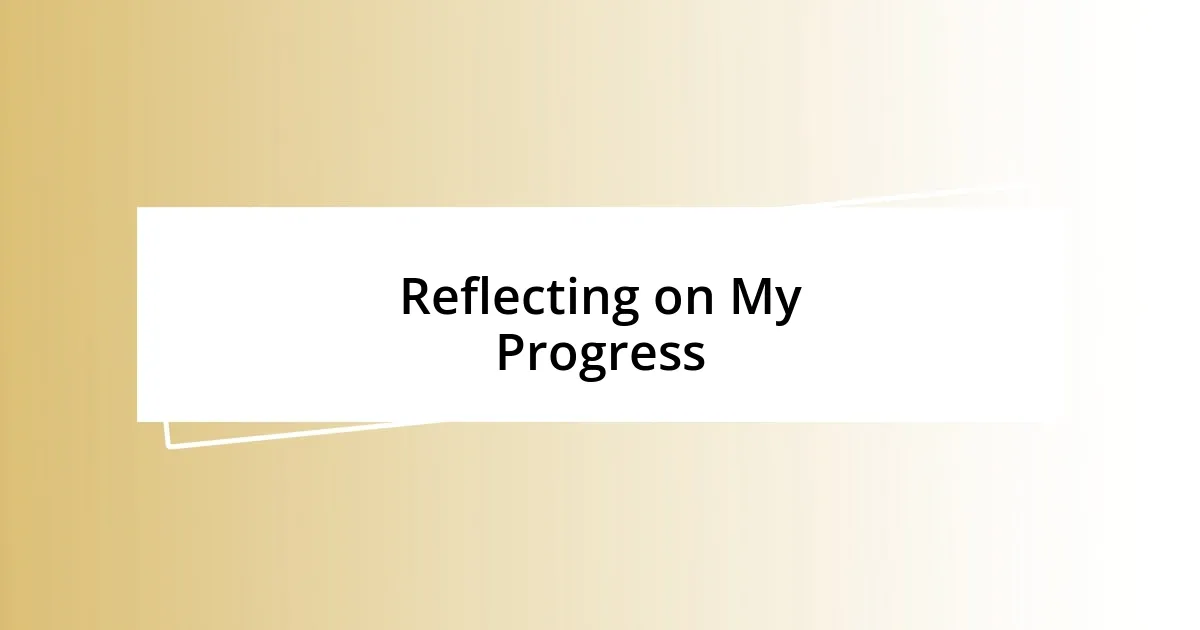
Reflecting on My Progress
Reflecting on my progress in nutritional counseling has been both enlightening and rewarding. One significant moment came when I stood on the scale after a few weeks of disciplined eating. I was surprised to see not just pounds lost but also how my energy levels had soared. It was as if the physical changes were merely the tip of the iceberg, while my emotional and mental clarity blossomed beneath the surface. Have you ever felt such a profound shift within yourself that it changes how you view your whole life?
As I looked back on my journey, I could clearly see how embracing the process rather than just focusing on the outcomes changed everything for me. I remember the day I realized that the journey itself was just as important as reaching my goals. Each week brought new insights, whether it was learning about portion sizes or discovering alternative recipes that made my meals more enjoyable. This wasn’t just about food; it was about crafting a lifestyle I genuinely loved. Isn’t it fascinating how much we can grow when we shift our mindset from one of restriction to one of exploration?
Ultimately, reflection has helped me appreciate the small victories. I think about the times I chose a fresh fruit salad over a store-bought pastry at work. In the past, those decisions would have felt like a chore, but now they feel like triumphs. It’s those little moments that began to weave a tapestry of healthier habits and choices. Looking back on my experience, I’ve come to realize that self-compassion during challenging days is essential. After all, progress isn’t a straight line, but a beautifully winding road that invites curiosity and joy along the way. Wouldn’t you agree that celebrating each step can turn the whole journey into something truly special?









